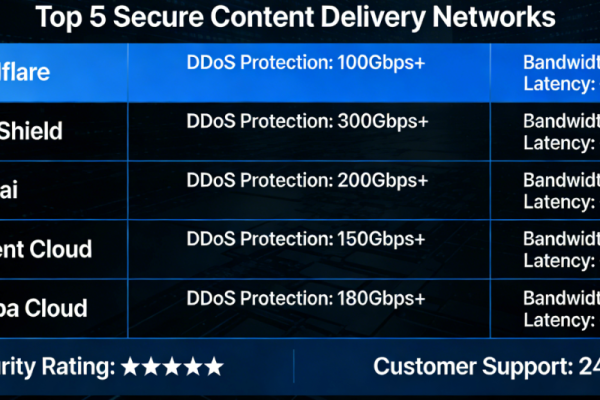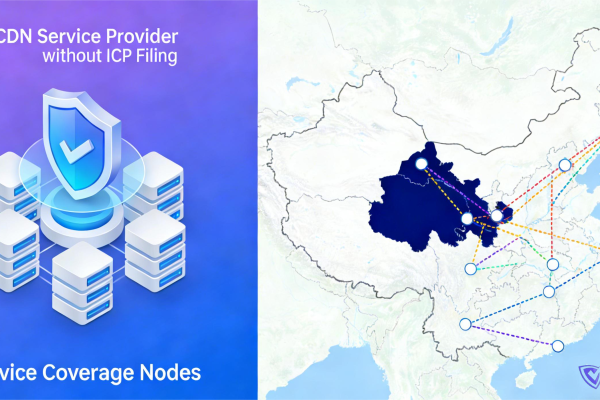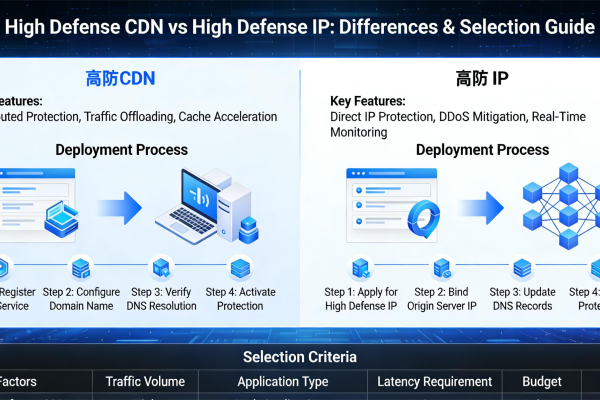Comparative Analysis of High-Security CDN and Standard CDN & Recommended Reliable CDN Providers
What’s the difference between high-security CDN and standard CDN? This article explains it in a simple, easy-to-understand way, covering their distinctions, protection mechanisms, and applicable scenarios. It also recommends trustworthy CDN providers based on real-world use cases, helping you choose wisely and avoid pitfalls. Ideal for webmasters, e-commerce operators, and gaming site managers.

If you run a website, a mini-program, an app, or are involved in e-commerce or live streaming, you’ve probably heard of "CDN." Its full name is "Content Delivery Network," which essentially refers to a technology that makes your website load faster, more stable, and less vulnerable to attacks.
As malicious attacks on the internet increase—such as DDoS (massive traffic attacks) becoming a nightmare for many websites—"Anti-DDoS CDN" has grown in importance. However, many people struggle to understand the differences between regular CDN and Anti-DDoS CDN, let alone how to choose a provider. This article will delve into these topics.
II. Basic Concept of CDN, Explained Simply
CDN is like building multiple "speed boost stations" for your website. For example, if your website server is in Beijing, but a user in Guangzhou tries to access it, without CDN, their request has to travel halfway across China, naturally slowing things down.
With CDN, however, the user might access a local CDN node in Guangzhou. CDN servers cache your website content in advance across various locations, so when someone visits, the data is retrieved nearby, significantly speeding up the process.
CDN also helps offload pressure from your origin server. For instance, during a sudden surge in traffic (e.g., a promotional event), CDN nodes can "stand in front," preventing your website from crashing.
III. Core Differences Between Regular CDN and Anti-DDoS CDN
- Different Anti-Attack Capabilities
Regular CDN focuses on "acceleration", while Anti-DDoS CDN emphasizes "protection".
Regular CDN handles normal traffic with ease, but when faced with large-scale malicious attacks like DDoS (Distributed Denial of Service), it may fail. Anti-DDoS CDN not only accelerates but also adds a "shield."
It automatically identifies malicious traffic—for example, thousands of requests disguised as legitimate users—detects and blocks them instantly, allowing real users to continue accessing your site.
- Differences in Node Bandwidth and Hardware Resources
Anti-DDoS CDN is typically backed by robust bandwidth resources, such as hundreds of gigabits or even terabytes of reserved bandwidth, along with high-performance protection equipment like intelligent traffic scrubbing systems and WAF (Web Application Firewall). Regular CDN, on the other hand, often only caches content without these "weapons."
- Different Use Cases
Regular CDN is suitable for: corporate websites, e-commerce platforms, and content-based sites with moderate traffic and low attack risk. Anti-DDoS CDN is ideal for: sites prone to attacks, such as financial platforms, gaming servers, live streaming, flash sales, e-commerce promotions, or industries targeted by gray-market activities.

IV. What Can Anti-DDoS CDN Protect Against?
- DDoS Attacks (Traffic-Based) Attackers flood your site with traffic from botnets, overwhelming your bandwidth.
- Anti-DDoS CDN Can Divert + Scrub Traffic, distinguishing real users from attackers.
- CC Attacks (Application Layer) Requests appear normal but arrive at extremely high frequencies, aiming to overload your server. Anti-DDoS CDN detects such anomalies, limits request rates, or blocks IPs.
- Web Attacks Like SQL injection, XSS scripting, or directory traversal. Anti-DDoS CDN often integrates WAF to block these hacking attempts in real time.
- DNS Attacks Some attacks target your domain’s DNS system. Anti-DDoS CDN providers usually offer protective DNS services to prevent hijacking or outages.
V. How to Determine If Your Site Needs Anti-DDoS CDN?
Consider these factors:
- Is your site frequently attacked (e.g., recent crashes or downtime)?
- Is it targeted by gray-market activities (e.g., gambling, scalping, or illicit trades)?
- Does traffic spike occasionally (e.g., during promotions or events like Black Friday)?
- Is uptime critical for your business (e.g., finance, healthcare, gaming, or live streaming)?
If you answered "yes" to 2+ questions, consider \Anti-DDoS CDN soon.
VI. How Anti-DDoS CDN Works (Simplified)
Anti-DDoS CDN combines "interception + acceleration". When users visit your site, they first reach a CDN node (not your origin server). The node then decides:
- Legitimate user? Grant access with accelerated speed.
- Malicious request? Block and discard it.
- Bot traffic? Deploy CAPTCHA or behavioral analysis.
Meanwhile, Anti-DDoS CDN caches static content (images, videos, pages) at nodes to reduce origin server load, while dynamically routing other requests.
VII. Key Metrics for Choosing an Anti-DDoS CDN Provider
- Protection Bandwidth A critical metric—providers range from 50G to 2T, impacting attack resilience.
- Intelligent Traffic Scrubbing Automated detection and filtering are essential; manual monitoring can’t keep up.
- Comprehensive Defense Features Look for WAF, CC protection, DNS protection, etc.
- 24/7 Support Team Attacks can happen anytime; rapid response is crucial.
- Global Node Coverage & Fast Origin Response Acceleration remains a core CDN function.
- Transparent Pricing & Flexibility Avoid hidden costs; opt for pay-as-you-go models.
VIII. Recommended Anti-DDoS CDN Providers (Global) China:
- Tencent Cloud Anti-DDoS CDN
- Pros: High bandwidth, strong protection, integrated cloud ecosystem.
- Ideal for: Medium/large enterprises, gaming, e-commerce.
- Alibaba Cloud Anti-DDoS IP/CDN
- Pros: Full cloud integration, customizable protection tiers.
- Ideal for: Finance, e-commerce, live streaming.
- Baidu Cloud Acceleration
- Pros: Affordable for SMEs.
- Ideal for: News portals, e-commerce sites.
Global:
- Cloudflare
- Pros: Free basic plan, global network, Web Application Firewall (WAF).
- Ideal for: Global businesses, individual developers, startups.
- Akamai
- Pros: Largest global node network, reliability.
- Ideal for: Multinational corporations.
- Imperva Incapsula
- Pros: Top-tier protection, AI-driven attack detection.
- Ideal for: High-security sectors (finance, healthcare).
- 08Host Anti-DDoS CDN (Popular among SMEs)
- Pros: Custom protection strategies.
- Ideal for: Gray-market adjacent industries, small gaming platforms.
- \CDN07
- Pros: Accepts cryptocurrency, no content restrictions, no registration/real-name requirements.
- Ideal for: Gray-market adjacent industries, gaming, social platforms.
IX. Is Anti-DDoS CDN Deployment Complicated? Many worry about setup, but mainstream providers offer user-friendly solutions.
Typical Deployment Steps:
- Point your domain’s DNS to the CDN provider’s node IP.
- Configure caching rules and protection policies in the dashboard.
- Test and enable full-site protection.
Most providers also offer technical support via tickets or hotlines.
X. FAQ
- Does Anti-DDoS CDN Slow Down Websites? No—it enhances speed while protecting.
- Can It Block All Attacks? No solution is 100% foolproof, but it stops most threats with automation.
- Is It Expensive? Costs vary; basic plans start at a few hundred USD/month, scaling with bandwidth/usage.
- Can I Switch from Regular CDN to Anti-DDoS CDN? Yes. Many providers support seamless migration.
Final Notes
Previously, "being attacked" was seen as a big-company problem. But hackers now target anyone—online educators, small-game developers, or mini-program operators. Anti-DDoS CDN isn’t just for enterprises; it’s becoming a standard for internet security.
If you don’t want your hard work ruined by sudden downtime, user complaints, or search engine delisting, adopting Anti-DDoS CDN is like buying insurance for your online venture.
If this article helped, share it with fellow developers and entrepreneurs—let’s bridge the "security gap" together.
Share this post:
Related Posts

Hong Kong High-Defense CDN Recommendations (2026 Latest Edition)
Not all Hong Kong high-defense CDNs can withstand attacks. This article compares the protection stre...

No-ICP CDN Recommendations | Which Ones Actually Speed Up Mainland China AND Can Withstand Attacks?
How to choose a no-ICP CDN? Based on real webmaster tests, this article compares multiple CDN provid...

What's the Difference Between DDoS-Protected CDN and DDoS-Protected IP? A Clear Guide to Help You Choose.
What's the difference between a DDoS-protected CDN and a DDoS-protected IP? Which one should your we...
